|
|
|
Sort Order |
|
|
|
Items / Page
|
|
|
|
|
|
|
| Srl | Item |
| 1 |
ID:
132382
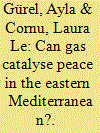

|
|
|
|
|
| Publication |
2014.
|
| Summary/Abstract |
The economic rationale for energy collaboration between Turkey, Cyprus and Israel is compelling. Cyprus and Israel need commercially viable export routes for their gas while Turkey is eager to diversify and increase its gas supplies. Hydrocarbon resources could potentially be a catalyst for both bringing about a Cyprus settlement and a Turkey-Israel rapprochement. A trilateral cooperation scheme involving a Turkey-Israel pipeline and an LNG plant in Cyprus could offer strong commercial incentives to all parties. But it would require bold political vision on the part of the region's leaders, coupled with backing from influential external actors with an interest in reconciliation and stability in the Eastern Mediterranean.
|
|
|
|
|
|
|
|
|
|
|
|
|
|
|
|
| 2 |
ID:
182986


|
|
|
|
|
| Summary/Abstract |
China seeks to build a multipolar architecture in the Eastern Mediterranean through economic expansion without challenging the political and security order in the region. Unlike the United States, Russia, Britain and France, which rely on military presence in the region, China has built substantial economic presence within its ambitious framework of the Belt and Road Initiative, exemplified by its seaport diplomacy towards Greece, Turkey, Egypt, Israel and Lebanon. China's seaport diplomacy is shaped by its development-oriented mentality, and driven by the economic competitiveness of the host countries, China's economic interdependence and political affinity with the target states, as well as the development potential and the regional influence of the target seaports. Beijing highlights that its geoeconomic interests, manifested in its participation in seaport development, are compatible with other great powers' geopolitical interests in the region. However, China's seaport diplomacy there faces various hurdles, including seaport overcapacity, debt problems and great powers' geopolitical rivalry due to China's ambiguity of strategic motives. In the long run, China's commercial seaport projects in the Eastern Mediterranean may have potential to clash with the United States and the European Union due to the escalating mutual mistrust among great powers, making it hard for Beijing to seek economic benefit while avoiding political entanglement.
|
|
|
|
|
|
|
|
|
|
|
|
|
|
|
|
| 3 |
ID:
189534
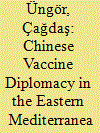

|
|
|
|
|
| Summary/Abstract |
This article examines China’s vaccine drive in Eastern Mediterranean countries of Türkiye, Egypt, Syria, Lebanon, and the Palestinian territories during 2020–2021 from a soft power angle.1 Although Chinese COVID-19 era health diplomacy is presented as a major breakthrough in the West, this study argues that continuities are more visible in the Eastern Mediterranean context with regard to China’s discourse and diplomatic practices. Beijing invested in the existing notions of propaganda, such as solidarity with developing countries, anti-Americanism, and economic partnership. In assessing the impact of Chinese vaccine diplomacy in the Eastern Mediterranean, the study investigates major diplomatic events and concludes that China could not improve its image in Türkiye in the aftermath of the COVID-19 pandemic.
|
|
|
|
|
|
|
|
|
|
|
|
|
|
|
|
| 4 |
ID:
164265


|
|
|
|
|
| Summary/Abstract |
This article examines the Russian military involvement on land in Syria and in the Eastern Mediterranean Sea. It considers, in particular, why the point is constantly being made in Russian political and military circles that these two commitments will be ‘permanent’ in nature. It begins by providing the rationales for the initial establishment of a Russian Eastern Mediterranean naval flotilla and the later sending of ground troops with air support to Syria. It goes on to show what benefits — geopolitical, political, military, and, in particular, strategic — have accrued to Russia from the combination of these two missions. The article concludes by showing that these benefits are too substantial for any Russian political leader to contemplate a withdrawal from Syria at any point in the foreseeable future.
|
|
|
|
|
|
|
|
|
|
|
|
|
|
|
|
| 5 |
ID:
171719
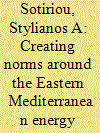

|
|
|
|
|
| Summary/Abstract |
The energy discoveries in the Eastern Mediterranean since the 2000s have placed the long-standing rivalry between Turkey and Cyprus (and by extension Greece) in a new context, bringing also Egypt and Israel into the geopolitical equation. Turkey, on the one hand, has adopted an assertive profile, whereas, on the other hand, two axes of cooperation have been formed, Greece-Cyprus-Egypt and Greece-Cyprus-Israel, convening trilateral summits and signing agreements. In view of that, it is currently upheld that the confluence of energy interests among the actors of the trilateral summits has facilitated a legalisation throughout the Eastern Mediterranean, propelling states towards the development of the energy resources according to the UNCLOS, and the implementation of the international law in the Cyprus problem, as a necessary means of guaranteeing the actors’ sovereignty, creating norms, and enhancing security, without targeting any third country. The argument shows how legalisation, as a special form of institutionalisation, and soft law, in particular, nurture regional cooperation and place it under the “protective wings” of international institutions.
|
|
|
|
|
|
|
|
|
|
|
|
|
|
|
|
| 6 |
ID:
130530
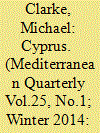

|
|
|
|
|
| Publication |
2014.
|
| Summary/Abstract |
The eastern Mediterranean, and particularly Cyprus, had been set for some sort of international crisis throughout 2013. Many tense situations become spring loaded by their circumstances, and no one can predict what, if anything, might set them off. But in the politics of the eastern Mediterranean, there are so many hefty mice at large that it is increasingly likely that at least one of the them will run across the pressure plate, probably sooner rather than later. The fact is that Cyprus finds itself caught in the shockwaves of a number of upheavals in the Middle East and in Europe and in the increasingly fraught politics of the eastern Mediterranean itself-and at a time when the Cypriot government is least able to operate independently and navigate its own diplomacy in its own national interests.
|
|
|
|
|
|
|
|
|
|
|
|
|
|
|
|
| 7 |
ID:
140441
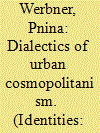

|
|
|
|
|
| Summary/Abstract |
Cosmopolitan cities have been envisioned as colourful, aesthetically creative places at the centre of trade routes and empires, imaged in their bazaars and cafes, where spices and exotic objects are traded or avante-garde artistic and literary expatriates congregate. In the twenty-first-century world of accelerated migrations, cosmopolitan cities are made visible in the proliferation of ethnic restaurants and festivals. But despite their cultural heterogeneity, cosmopolitanism in cities remains a fragile achievement. Such cities have the potential, it seems, to erupt into violence or, on the contrary, to display an intercultural creativity that transects and transcends social divisions. Building on Humphries and Skvirskaja’s work on ‘post-cosmopolitan’ cities, the present paper compares Eastern Mediterranean cities historically famous for their cosmopolitanism like Istanbul and Thessalonika, contemporary post-Communist cities like Sarajevo or Odessa and twenty-first-century global cities like Cairo or London to ask: what makes these cities both cosmopolitan and anti-cosmopolitan?
|
|
|
|
|
|
|
|
|
|
|
|
|
|
|
|
| 8 |
ID:
132381
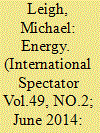

|
|
|
|
|
| Publication |
2014.
|
| Summary/Abstract |
Energy trade cannot overcome longstanding political conflicts. There are no 'peace pipelines' anywhere in the world. Rather peace is a condition for investment in pipelines and other forms of energy infrastructure. Where political breakthroughs have been achieved, however, energy trade can reinforce cooperation between states and contribute to regional stability. These considerations are particularly pertinent to the Cyprus settlement talks and Middle East Peace Process, against the background of energy discoveries in the Eastern Mediterranean.
|
|
|
|
|
|
|
|
|
|
|
|
|
|
|
|
| 9 |
ID:
155565


|
|
|
| 10 |
ID:
181730


|
|
|
|
|
| Summary/Abstract |
Claiming a more realistic and interest-driven approach to foreign policy, European Union (EU) Commission President Ursula von der Leyen has presented her team as a “geopolitical” commission. While the EU exerts a strong influence on its neighborhood when it is able to set incentives, its impact on states or regions is restricted if these incentives are missing. Here, only the combined political and economic clout of the member states can make a difference. The Eastern Mediterranean is a region where both shortcomings coincide: The EU cannot offer membership, and the member states do not speak with one voice. The result is the failure to perform “geopolitical actorness.” This weakness becomes apparent on different levels of conflict in the Eastern Mediterranean: the bilateral, the regional, and the international.
|
|
|
|
|
|
|
|
|
|
|
|
|
|
|
|
| 11 |
ID:
128055
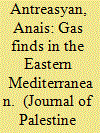

|
|
|
|
|
| Publication |
2013.
|
| Summary/Abstract |
This article looks at the gas discoveries in the eastern Mediterranean since the late 1990s and how they have fueled-or otherwise intersected with-the various regional conflicts. About half of the article examines the fate of the 1999 gas discoveries off Gaza (within the maritime space set for the Palestinians by Oslo), and Israel's role in controlling the outcome. The other half is devoted, collectively, to the gas discoveries off Israel, Egypt, and Cyprus, as well as to the ensuing disputes and shifts of alliances involving these three states plus Lebanon and Turkey. Given the state of flux in the region, it is too soon to speculate on the ultimate geopolitical impact of the new finds.
|
|
|
|
|
|
|
|
|
|
|
|
|
|
|
|
| 12 |
ID:
130528
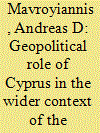

|
|
|
|
|
| Publication |
2014.
|
| Summary/Abstract |
This essay explains how Cyprus is positioned to play a constructive and stabilizing role in the eastern Mediterranean and how valuable this role can be for the foreign and security policy of the European Union. Offshore hydrocarbon discoveries in Cyprus's exclusive economic zone can transform the island into a regional energy hub and an important pillar for Europe's energy security and diversification. At the same time, these discoveries can create an additional impetus to end the long division of the island
|
|
|
|
|
|
|
|
|
|
|
|
|
|
|
|
| 13 |
ID:
137612
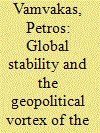

|
|
|
|
|
| Summary/Abstract |
The geopolitical game of the twenty-first century will be multilateral and multidimensional, placing great emphasis on political and commercial interests such as resources, markets, ecology, and finance than on military interests. This essay argues that the eastern Mediterranean as an area of geostrategic importance will continue to be vital to global geopolitics and that consigning it to the back burner is shortsighted. The three continents that meet at this crossroads account for almost 90 percent of the global population as well as over 60 percent of global gross domestic product.
|
|
|
|
|
|
|
|
|
|
|
|
|
|
|
|
| 14 |
ID:
105537
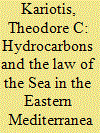

|
|
|
| 15 |
ID:
131140
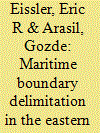

|
|
|
|
|
| Publication |
2014.
|
| Summary/Abstract |
Since 2002, the Republic of Cyprus, the Turkish Republic of Northern Cyprus, Turkey and Greece have been embroiled in disputes over the delimitation of maritime boundaries in the Eastern Mediterranean. Geopolitically and geostrategically important, the area's rich oil and natural-gas reserves have made Exclusive Economic Zones all the more relevant. Eric R Eissler and Gözde Arasýl analyse the latest developments, military postures, and the political and legal positions of the parties involved, concluding that, even though a military clash remains a remote possibility, the stalemate is likely to persist.
|
|
|
|
|
|
|
|
|
|
|
|
|
|
|
|
| 16 |
ID:
189539
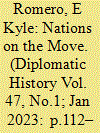

|
|
|
|
|
| Summary/Abstract |
In January 1923, a treaty between the warring nations of Greece and Turkey authorized by the League of Nations empowered the two states to denaturalize and expel over one and a half million residents of their nations in what became known as the Greco-Turkish population exchange. Hundreds of thousands of Greek and Turkish residents deemed ethnic minorities—Greeks in Turkey and Turks in Greece—were stripped of their citizenship and forced out of their homes on the promise that citizenship, along with housing and welfare, would await them in their new home country. While the Greek and Turkish governments oversaw the eviction and expulsion of their counterparts’ newly made citizens, the actual movement of these refugees took place largely under the official protection of the U.S. Navy, with the transportation out of Turkey under the auspices of an American humanitarian organization, Near East Relief (NER). NER’s role in the exchange represented a radical break from years of work in the region focused on nurturing a generation of American educated Christian minorities to “reconstruct” the Middle East.
|
|
|
|
|
|
|
|
|
|
|
|
|
|
|
|
| 17 |
ID:
183981
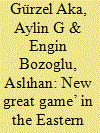

|
|
|
|
|
| Summary/Abstract |
This article examines the vicissitudes in regional affairs in the Eastern Mediterranean and their impact on the geopolitics of energy and geo-cultural realities. Framing the ‘logic of competition’ (energy market realities/geo-economics) and securitisation of energy politics by focusing on different scenarios, it explores the significance of international supply chains; the consequences of the emergence of Israel as a regional gas supplier superpower; Turkey’s uncertain position as an energy barrier or bridge; and the role played by multinational companies (MNCs), the so-called ‘new great gamers’. The scope of the game has expanded and spilled over from the Black Sea region to the Eastern Mediterranean. In this context, Israel’s geopolitical approach is significant in the pursuit of wider economic and security interests.
|
|
|
|
|
|
|
|
|
|
|
|
|
|
|
|
| 18 |
ID:
139383
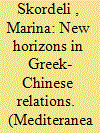

|
|
|
|
|
| Summary/Abstract |
Since about 2005 relations between Greece and China have gained unprecedented momentum. At first glance, the timing and the reasons behind such a boost in bilateral relations between countries so distant and unequal in size are not entirely obvious. This essay examines how the strategic priorities of Greece and China met and describes the turning point that offered the opportunity. Emphasis is given to collaboration in the maritime sector, which is a strong asset of both countries. The essay also studies the strategic implications of such cooperation for the broader region of the eastern Mediterranean and the prospects it presents for Euro-Atlantic strategic priorities.
|
|
|
|
|
|
|
|
|
|
|
|
|
|
|
|
| 19 |
ID:
144493


|
|
|
|
|
| Summary/Abstract |
There have been important changes in the politics of the eastern Mediterranean since the discovery of energy resources and the disintegration of Turkish-Israeli relations. Israel upgraded its relationship with Greece and Cyprus after its ties with Turkey deteriorated. Since shortly after the 2010 Mavi Marmara incident, the widening divergence in interests between Turkey and Israel have provided the geopolitical impetus for the development of a rapprochement between Greece and Israel. While political, military, and economic cooperation, in particular, between Israel and Greece have significantly developed, the relations have also blossomed over mutual concern about the energy resources in the eastern Mediterranean. This essay examines the burgeoning relationship between Israel and Greece since 2010 and considers whether this relationship constitutes an important strategic alliance in the eastern Mediterranean.
|
|
|
|
|
|
|
|
|
|
|
|
|
|
|
|
| 20 |
ID:
118251


|
|
|
|
|
|
|
|